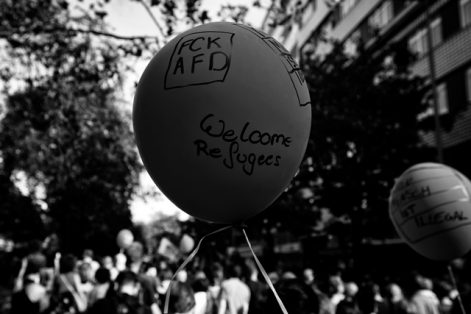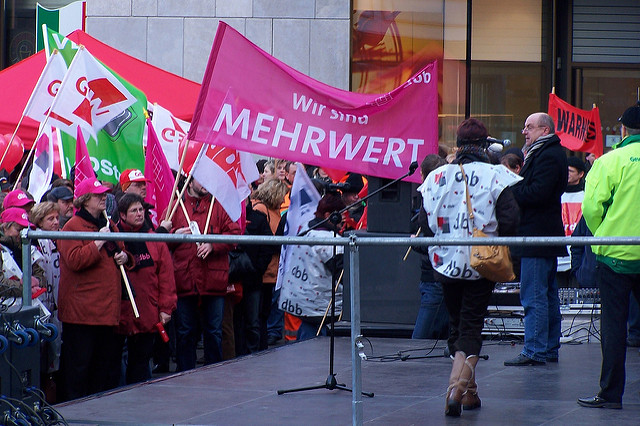| The Left in an Immigration Germany: Emancipatory Class Politics for a Solidary Immigration Society

The social question is back, returned to the political agenda as a question of global (in)justice by the migration movements of recent years. The dramatically unequal global distribution of wealth and imperial mode of production and way of life underlying said distribution constitute a central source of worldwide migration. Even Angela Merkel was compelled to acknowledge as much in 2015, remarking that the globalisation which many in Germany have experienced as relative beneficiaries in one of the world’s leading export countries had now returned in the form of refugees. Her comments hint at the deeper question of what “our” way of life has to do with the wars, authoritarian regimes, hunger, climate change, and economic exhaustion under which so many millions suffer. That said, it often comes across as rhetoric and false moralism when the Left claims that “we” live at the expense of “others”. After all, the injustices of exploitation, marginalisation and degradation confronting many in our own country pale in comparison to the levels of suffering rife in large parts of the world, while the interconnected social relations which produce misery both here and abroad are largely obscured from public discussion. But how can a political project seeking to organise majorities for social change in a wealthy capitalist centre address these people as well?
Right- and Left-Wing Conceptions of Justice
For the time being, the political Right appears to be the social force posing the social question most successfully. It does so by portraying the challenges of a globalised world and the immigration society which has long since become German reality as a conflict of competition and distribution between those already here and those seeking to come here, whether real or imagined. The everyday concerns of many people – constant insecurity, the inability to plan their own lives, pressure at work, the threat of downward mobility, a lack of durable infrastructure and the fear of never escaping exhaustion and becoming politically marginal – are taken up by right-wing discourse and juxtaposed to the allegedly comfortable situation of refugees. Desires for justice are diverted into anger and hate towards an open and pluralistic society. Security and fairness, so goes the line of argument, are only possible within the confines of a homogenous German nation-state which insulates itself from the impositions of the outside world. The Right casts the social question as a cultural struggle, and thus as an attack on a society of the many, and ultimately on the conditions of life for everyone.
But what could left-wing responses look like in this constellation? So far, the debate has proven divisive:
Parts of the Left have taken the Right’s success as an occasion to (re-)focus their attention on those actually or at least allegedly attracted to the Right’s narrative – sometimes by making “concessions” to their racist and national-social arguments in the process. The price of these concessions is an at least implicit reproduction of the notion that a socially relevant conflict between society’s “left behind” on one side and refugees on the other does in fact exist.
Others in this constellation correctly emphasise the struggle against racism, sometimes sharply disassociating themselves from positions which seek to win people over to a left-wing project currently on the fence vis-à-vis right-wing mobilisations. If necessary, they argue, we must accept splits on the Left in order to pursue an emancipatory project exclusively with the “dissident third” (Seibert), that is, with those already committed to solidary praxes and an open and pluralistic society. Or, as Jan Ole Arps put it in Analyse & Kritik: “as the Left, why not simply focus on those who are threatened by the Right, rather than on those who trail behind it like the Pied Piper, even if they are not dedicated racists?”
Class Relations and Struggles for Emancipation
Or is the question posed in the wrong way? After all, this phrasing seems to suggest that racism and social marginalisation can or even should be addressed separately. Yet racism and class relations are intimately intertwined – in fact, it is precisely this false dichotomy between emancipatory and way-of-life questions on one hand and issues of social justice on the other that has allowed the Right to do so well in the first place. It is true that parts of the Left inhabit academic subcultures, while others refuse to recognise anti-racist, queer or feminist praxes as true social struggles, helping to further this division. The emancipatory struggles of the “New Left”, the women’s and environmental movements, and struggles for a pluralisation of modes of living (whether of LGBTI people or migrants) allowed themselves to be painted into a corner as struggles of social recognition, and often failed to pose their issues as also questions of social justice. They were reduced to middle-class projects in many instances, far removed from the day-to-day lives of large segments of the working class – as if workers were not gay and lesbian, interested in ecologically sustainable modes of living, or unaffected by racism. It is for this same reason that social gains in emancipation and freedom were so easily integrated into the neoliberal project, and why the Right manages to portray their rebellion against the status quo as a battle against the “musty 1968ers” and their alleged political correctness.
For feminism, this meant that labour market integration and gender quotas effectively became political demands for highly-qualified women, while women from less-qualified sections of the working class either already worked anyway or were forced to by downward pressures on the family wage. Often part-time, menial and poorly paid, this work brought most women neither financial independence under patriarchal conditions nor self-realisation in the form of a good job, while exerting tremendous pressure on the traditional family model and destabilising dominant conceptions of masculinity without offering alternative frameworks. This crisis of family and gender relations and the frustration of not having profited from gender equality measures is part of the reason why the Right can discredit them as part of the system of the elites.
The women’s movement has become a movement of the well-paid and highly-educated. Similar is true for the “migrantisation” of society. Globalisation and transnationalisation of modes of culture and living were seized upon by post-1968 left-liberal milieus as a way of life and cultivated self-image. While some managed to profit from diversity, transculturality and freedom of movement, others remained trapped in culturally and economically declining regions and peripheries. As the Left retreated from social struggles almost entirely, it was also largely uninvolved in the labour struggles of migrant wage-earners. The Left “took care” of refugees, but rarely viewed migrants as subjects of emancipatory struggles in their own right. All exceptions aside, the prominence of the renters’ association “Kotti & Co” shows how uncommon praxes like a common struggle for affordable rents and the right to the city between socially and culturally heterogeneous groups have become in recent decades. The selective integration and depoliticisation of struggles around social recognition and the ignoring of class relations within them ultimately came at a cost to the overwhelming majority – both “native” workers as well as migrants, most of whom also belong to the working class.
Following years of separation, a distinct lack of theoretical and practical experience in leading struggles for emancipation and recognition as social struggles cannot be denied. This also explains why analyses of the Right’s success are often oversimplified, counterposing cultural and economic moments. It is true that the poorest in our society do not vote overwhelmingly for the Right – 45 percent of the poor do not vote at all. Nevertheless, failing to connect the Right’s success to the systematic destabilisation of labour and social relations, hyper-exploitation, the growing gap between the superrich and the majority of the population, systematic political marginalisation, demobilisation and the hollowing out of democracy would be analytically negligent, to say the least. The reverse, however, is also true: taking precarisation seriously cannot mean ignoring the “cultural” moments of right-populism, as affects like xenophobia, fear and hate of difference certainly play a role. Étienne Balibar and others have argued that the culturalisation of social difference belongs to the standard repertoire of contemporary racism; the production of cultural Otherness is the precondition to integrating segments of the subaltern into an increasingly authoritarian state project in the first place.
Marxist cultural theory has pointed to this connection for some time now. As Stuart Hall once observed: “racism is also one of the dominant means of ideological representation through which the white fractions of the class come to ‘live’ their relations to other fractions, and through them to capital Itself. […] This is the ideological class struggle, pursued, precisely, through harnessing the dominated classes to capital by means of the articulation of the internal contradictions of class experience with racism.” Organising growing social discontent to establish a new, authoritarian-neoliberal political project along racist, anti-feminist and culturally homogenising lines is precisely what right-populism is (successfully) attempting at the Moment.
The Left must oppose this division of the subaltern by placing questions of emancipation at the heart of social struggles and formulating them as class questions while, on the other hand, making questions of social justice core themes of struggles around modes of living. Only an anti-racist class politics and advocacy for a solidary immigration society with a social safety net for all can offer an attractive alternative to the Right’s false promises.
Anti-Racist Class Politics
But what could such an inclusive anti-racism look like? What about an intersectional and internationalist class politics? LuXemburg 1/2017 surveys the terrain and takes a closer look at points of departure for connective perspectives and solidary praxes in this field.
A credible Left cannot afford to limit its politics to the national sphere. In light of transnational production, trade and communication, our only option is to “sublate” this globality. In order to do so, relations of inequality must be accounted for and addressed as transnational class relations – beyond passive moral economies and appeals to reduce consumption (see Adamczak in LuXemburg 1-2017). Many struggles today revolve around the right to global freedom of movement. Here, we must take up these impulses while simultaneously countering the fears of “unstoppable floods” stirred up by the Right both discursively and with concrete, material policies. An offensive debate for a socialist immigration policy offers a possible point of departure for such an initiative (see Kreck and Schindler in LuXemburg 1/2017). However: not everyone wants to come to Europe – this notion itself is an absurd fantasy pushed by the Right. Everyone who wants to determine their own future beyond economic and political coercion, who wants to live their hopes and dreams – wherever they may be – must be part of a Left project. Trésor (in LuXemburg 1/2017) correctly stresses the importance of the right to leave and to stay in the context of current debates. Here, the Left could simply “participate” – that is, join in existing praxes.
Yet bringing “struggles of migration” (see Kron in LuXemburg 1/2017) to the centre of our attention applies not only with regard to transnational questions – particularly at the local level, there are more instances of successful conviviality and solidary co-existence than most debates on the Left acknowledge. Kotti & Co stands for a praxis of social struggle which is not only led by and with the local population, but even in cooperation with “native Germans” and the Turkish and Kurdish communities (see Hamman at LuXemburg-Online). Movements for sanctuary cities and cities of refuge have also grown in importance in recent years (see Heuser in LuXemburg 1-2017). The most successful example can be found in New York City, where the project for a New York ID successfully built a cross-class, intersectional coalition transcending the immediate demands of undocumented migrants. Many queer people also apply for the card, as it does not obligate holders to specify their gender. Middle-class parents use it to access discounts at local recreational and cultural institutions, while many homeless and stateless persons use it, as it allows them to list an NGO’s address as their residence and avoid police harassment and intimidation (see Lebuhn at LuXemburg-Online). Developing similar policies which cohere distinct local interest groups and build coalitions between the middle- and lower-classes capable of transcending imaginary distinctions between native and foreign will be crucial to the Left’s future success or failure. Communal actors are not only improving conditions for new arrivals, but joining together in transnational networks of “Rebel Cities” to bring in refugees from the hotspots in Northern European countries (see Orlando in LuXemburg 1/2017). They find room to manoeuvre precisely where the European border regime stands diametrically opposed to an emancipatory migration policy, seeking to expand these spaces and connect them to social policies for all. In doing so, they chip away at the increasingly fragile self-image of Fortress Europe and its political elite, which seeks to preserve prosperity and secure its position vis-à-vis rising right-wing movements and parties at home by striking deals with foreign despots.
How to build and maintain such alliances is a central question confronting the Left today – as well as to what extent such initiatives can be extended into the struggle for democratically organised and free social infrastructure. Millions of people active in the welcoming initiatives of recent years had to grapple with decrepit or dysfunctional infrastructure, as well as with repressive and failing state authorities. To what extent can these experiences foster activism for the expansion and preservation – or against the privatisation – of hospitals, child care, and public transportation (see Mira Wallis on LuX-Online)? What role can the Left play in these contexts, and how can it root itself deeper and more broadly in Society?
Ultimately, we have to ask ourselves: what could communicative strategies against the social divisions described above look like?
The most important thing is that we begin speaking with people instead of about them. We cannot be satisfied with having the right answers, but rather must combine an openness to dialogue with uncompromising stances in, for example, questions of anti-racism, and thereby transcend the borders of social milieus which separate much of the Left from the subaltern and their daily lives. We are hardly prepared for taking steps into these lifeworlds and discursive constellations, but we must if we are to explore potential shared interests (see Steckner in LuXemburg 1-2017). A wide variety of people live in marginalised city neighbourhoods – how can shared concerns in the district be formulated, how can experiences with the unemployment office or municipal government be combined? How can experiences with globality occur in local organising projects without coming across as an Erasmus student or transnational jetsetter?
As far as these questions are concerned, praxis is not the only thing in short supply – we must take exploratory steps in conceptual terms as well. Although the debate on combining anti-racism and social justice is further along in the US (see Taylor in LuXemburg 1-2017), the German Left is not necessarily beginning from zero, either. How to retain the Left’s emancipatory struggles without permitting forms of selective integration will be a central question in the years to come.
Translated by Loren Balhorn
Reference
Stuart Hall, “Race, Articulation and Societies Structured in Dominance”, in Sociological Theories: Race and Colonialism, Paris: UNESCO, 1980, pp. 304–345.






